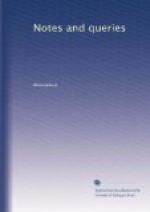GOMER.
Watewich (pp. 60. 121. 236.).—May not “Watewich” be Waterbeach?
S.S.S.
“By Hook or by Crook.”—I imagine that the expression “By hook or by crook” is in very general use throughout England. It was familiar to my ear forty years ago in Surrey, and within these four years its origin was (to my satisfaction at the moment) brought home to my comprehension in the North of Devon, where the tenant of a certain farm informed me that, by an old custom, he was entitled to take wood from some adjoining land “by hook and crook;” which, on inquiry, I understood to include, first, so much underwood as he could cut with the hook or bill, and, secondly, so much of the branches of trees as he could pull down with the aid of a crook.
Whether this crook originally meant the shepherd’s crook (a very efficient instrument for the purpose), or simply such a crook-ed stick as boys use for gathering hazel-nuts, is not very material. It seems highly probable that, in the vast forests which once overspread this country, the right of taking “fire bote” by “hook or crook” was recognised; and we can hardly wish for a more apt illustration of the idea of gaining a desired object by the ordinary means—“a hook,” if it lay close to our hand; or, by a method requiring more effort, “a crook,” if it were a little beyond our reach.
J.A.S.
By Hook or by Crook (pp. 205, 237. 281. &c.).—In confirmation of this phrase having reference to forest customs, my hind told me that my plantations were plundered by hook or by crook, and he and I once caught a man in flagrante delicto, with a hook for cutting green wood, and a crook at the end of a long pole for breaking off dry branches, which could not be otherwise reached. For an early use of the term, see Bacon’s Fortress of the Faithful, 1550.
“Whatsoever is pleasant
or profitable must be theirs by hook or
by crook.”
S.S.S. {406}
Tablet to Napoleon.—Will it assist “EMDEE’s” interpretation of the inscription to Napoleon (No. 17 p. 262.) if I suggest that it may mean—AEgyptiaco bis, Italico semper invicto?
C.I.R.
Feb. 25.
Lines on Pharaoh (No. 19. p. 298.).—I beg to inform “J.T.,” that the well-known couplet about Pharaoh, and rascal rhyming to pascal, are from a certain History of the Bible, or Bible History, by the Rev. Dr. Zachary Boyd, of Todrig, who was either Principal or Professor of Divinity at Glasgow in the seventeenth century.
He left considerable property to the College there, on condition that his bust should be placed in the quadrangle, and his great work printed under the care of the Academical Senatus. The bust was placed accordingly, and is, or lately was, to be seen in a niche over the inner doorway. The History was also printed, it is said, but never published. However, curious visitors have always, I believe, been allowed a peep into it—whether the MS. or the solitary printed book, I am not sure—and a few choice morsels are current. I recollect one stave of the lamentation of Jonah—




